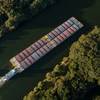Tanzania: Dar es Salaam 2015 Port Volume to Increase
Cargo volumes at Dar es Salaam port are expected to rise as much as 25 percent this year, helped by expanded capacity and improved efficiency, Tanzanian president Jakaya Kikwete said in his last address to parliament before an election in October.
The port, whose main rival is bigger but also congested Mombasa in Kenya, acts as a trade gateway for landlocked states such as Zambia, Rwanda, Malawi, Burundi and Uganda, as well as the eastern region of Democratic Republic of the Congo (DRC).
"In 2014 the port handled 14.4 tonnes of cargo ... We expect it to reach 18 million tonnes this year," Kikwete said late on Thursday.
"The port currently operates 24 hours a day and the speed of unloading and loading cargo has significantly increased ... even those who previously stopped using the port have now returned."
Tanzania said it wants to increase capacity to 28 million tonnes a year by 2020. The World Bank said last year that inefficiencies at Dar es Salaam cost Tanzania and its neighbours up to $2.6 billion a year.
Tanzania signed a $565 million deal last year with the World Bank and other development partners to expand the Dar es Salaam port, part of plans to boost the east African nation's role as a regional trade hub.
Kikwete said plans to build two new berths would double the number of containers handled by the port each year to 1.2 million twenty-foot equivalent units, or TEUs, from the current 600,000 TEUs.
"We are currently in discussions with the DRC and Zambia for a single customs territory to speed up cargo clearance at the Dar es Salaam port," he said.
Tanzania also plans to build a new, Chinese-backed $11 billion port at Bagamoyo to make it the region's biggest gateway and an engine of Africa's boom.
Like its neighbour Kenya, Tanzania wants to capitalise on a long coastline and to upgrade existing rickety railways and roads to serve growing economies in the heart of Africa.
Kikwete said the government would begin construction of a standard gauge railway line this year if it secured funding to link the Dar es Salaam port to regional economies. Transport contributes 15 percent of gross domestic product in he said.
Tanzania, east Africa's second-biggest economy, said in March it plans to spend $14.2 billion to construct a new rail network in the next five years financed with commercial loans.
Gas finds in Tanzania and oil discoveries in Kenya and Uganda have turned east Africa into an exploration hotspot for oil firms, but transport infrastructure has suffered from decades of under-investment.
Reporting by Fumbuka Ng'wanakilala














